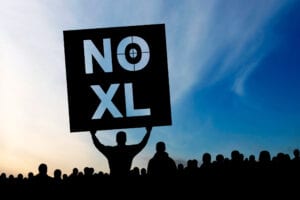Since Washington was locked down on inauguration day, President Joe Biden was free to spend his first day in office signing stacks of Executive Orders rather than attending the more traditional inaugural parades and balls. The object of these orders was, of course, to undo as much as possible everything the outgoing president, Donald Trump, had accomplished over the past four years.
Executive actions on climate and energy unsurprisingly dominated the first day’s to-do list. Since getting the U.S. out of the Paris climate treaty was Trump’s most consequential deregulatory action, it was fitting that Biden’s first signature was on a letter notifying the U.N. that America would be rejoining it.
Next, he signed a lengthy executive order that, among much else, canceled the permit for the mostly-completed Keystone XL pipeline, which would transport oil from Alberta’s oil sands to Gulf Coast refineries. Canceling Keystone immediately threw up to 11,000 well-paid construction workers out of their jobs. The trades union leaders who had endorsed Biden expressed their outrage, but the fact is that most of their members voted for Trump.

You got what you voted for, America.
Biden also ordered all government departments “to immediately commence work to confront the climate crisis,” and directed that all deregulatory actions on fossil fuel energy use and production taken by the Trump administration be reviewed with an eye to suspending and rescinding them.
The order re-instated the application of the “social cost of carbon” (an entirely speculative and largely fanciful cost estimate of the impact of adding one ton of carbon dioxide to the atmosphere) in regulatory decision-making and abolished Trump reforms aimed at speeding up the environmental permitting processes that are routinely used to delay politically incorrect energy and natural resources projects to death. For example, major hardrock mining projects that take two to four years to permit in Canada or Australia routinely take over ten years in the U.S.
On January 27 the White House held a "Climate Day," which included a major speech by the new president. It began, "Today is 'Climate Day' at the White House and—which means that today is 'Jobs Day' at the White House." The speech focused on two selling points aimed at two uneasy partners in the Democratic Party coalition—trades unions and the Woke left.
It turns out that addressing the climate crisis requires creating “millions of good-paying union jobs” in building the new green infrastructure. One imagines that these jobs will be much better than those created by the free market because they will be guaranteed and subsidized by government.
At a press conference after Biden’s speech, John Kerry, special presidential envoy for climate, was asked about people losing their jobs in fossil fuel industries as a result of the administration’s agenda. Kerry’s reply was predictably tone deaf:
What President Biden wants to do is make sure those folks have better choices, that they have alternatives, that they can be the people to go to work to make the solar panels.
Implied, but unacknowledged, was the fact that they first have to lose their jobs in order to access these "better choices."

Hitting Kerry in a bad place.
For the woke left, Biden offered something called "environmental justice." While it’s not clear exactly what the term means, the intended audience is a broad one:
With this executive order, environmental justice will be at the center of all we do addressing the disproportionate health and environmental and economic impacts on communities of color—so-called “fenceline communities”—especially those communities — brown, black, Native American, poor whites.
Several specific decisions were also announced during Climate Day, including a moratorium on new oil and gas leasing on federal lands and offshore areas (which account for nearly one-quarter of U.S. oil production).
In addition to these announcements, there was much speculation in the media about other planned actions. Most notably, the New York Times reported that the Federal Emergency Management Administration (FEMA) was planning to take three to ten billion dollars out of their reserves meant for dealing with disasters such as hurricanes and spend it on preparing for the impacts of "climate change." Possible projects include constructing sea walls to safeguard against rising sea levels (the current rate is between 7 and 14 inches per century).
But most importantly, Biden made it clear that the entire executive branch is going to be organized around addressing climate: "It’s a whole-of-government approach to put climate change at the center of our domestic, national security, and foreign policy." His executive order officially declares a "climate crisis." A climate office or program is being installed in every federal department and agency.

Or maybe it can.
All this activity requires a lot of new high-level staffing at the White House as well. In addition to Kerry, Gina McCarthy, former administrator of the Environmental Protection Agency under Obama and then president of a major environmental pressure group (the Natural Resources Defense Council, which had $173 million in income in 2018), has been named National Climate Advisor, with the same rank as the National Security Advisor.
McCarthy will be head of the White House Climate Policy Office and also oversee a National Climate Task Force. When Biden introduced McCarthy near the beginning of his Climate Day speech, he off-handedly let the cat out of the bag, saying “And Gina—you run everything, Gina."
The next step may be to declare a National Climate Emergency and invoke a wide range of special emergency authorities given to the president by Congress. This would allow the president to commandeer large parts of the economy not currently under government control.
It’s going to be a long, long way to climate nirvana, but we can next look forward to an undoubtedly scintillating international Climate Leaders’ Summit hosted by the United States. The White House has scheduled the summit for Earth Day, April 22, which appropriately would be the 151st birthday of Vladimir Lenin, the patron saint of national economic overhauls. No word, yet, on whether that's intentional.
I am a climate scientist and referee for the upcoming edition of the United Nations' periodic climate assessment report. In policy research that I have conducted I have discovered that the the model upon which the Paris Climate Accords is based violates the axiom of probability theory called "unit measure" with the consequence that the measure of an event is not a probability but rather is a non-probability. Consequently, runs of this model impart nil information gain to an official of a regulatory agency, such as the U.S. Environmental Regulatory agency, precluding regulation of Earth's climate system by this official. Thus, the money that will be spent by the Biden administration in its attempts at controlling Earth's climate system will be totally ineffectual. The article in which this contention is mathematically proved is at https://www.preprints.org/manuscript/202009.0223/v1#:~:text=Ineffectual%20Regulation%20When%20An%20Official%20of%20A%20Regulatory,Seems%20to%20Regulate%20Effectually%20Without%20Actually%20Doing%20So . My phone number is 1-650-941-0533 (Pacific Time Zone).
The previous comment is quite accurate. The history of the earth over the last four billion years (yes, four billion) is that the climate has varied enormously. Long before there was a human race driving automobiles and being warmed by furnaces the temperature during some eras was 10 degrees higher than today. For an excellent rebuttal of Al Gore's views, see Inconvenient Facts, a book by geologist Gregory Wrightstone available cheap from Amazon.
So the perennial question, just how many angels can dance on the head of the climate crisis pin? How absolutely ridiculous and destructive to have a government devoted to tilting at windmills thinking that mankind can control the temperature of the earth. Elections have consequences and I shutter at what consequences lie ahead.